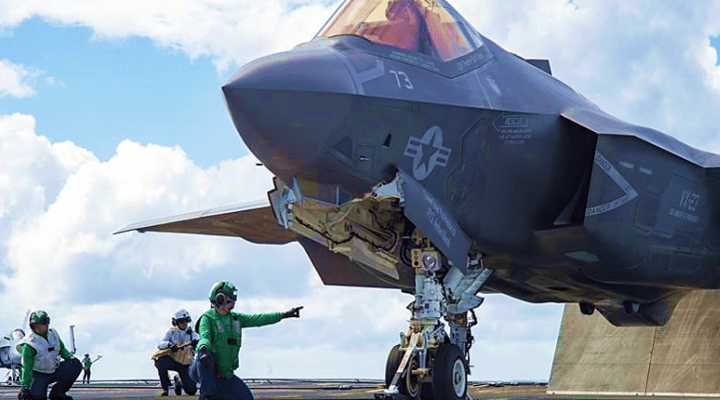Some things are objectively true. Like the fact that Lockheed Martin’s F-35 fighter is the most expensive weapons system program in human history. Or the fact that NATO member country Turkey has an increasingly strained relationship with the rest of the alliance.
And sometimes, two objectively true things run into one another and create a dilemma. This is where the U.S. finds itself right now, as some in Congress seek to prevent Turkey from purchasing F-35s because of the country’s decision to also buy the Russian-made S-400 anti-aircraft system. The Senate version of the National Defense Authorization Act, which passed by a vote of 85-10 on Monday, contains a provision to prevent Turkey from purchasing the F-35.
Defraying the costs of a huge drain on resources
“The F-35 Lightning II was designed to be an affordable 5th Generation fighter,” or so says the program’s commercial web page. “Since the first F-35 was built production costs have dropped approximately 60 percent,” it says. Even so, the program will cost the taxpayers more than $1 trillion over its lifetime. That’s a “1” followed by 12 “0”s. To give you and idea how much money that is, $1 trillion in $100 bills would cover more than a football field, stacked seven feet high.
The country’s richest man is Amazon founder and CEO Jeff Bezos, whose net worth is apparently now a staggering $141 billion. It would take more than seven Jeff Bezoses to pay for the F-35 program. That’s a lot of Jeffs. So we need to find ways to reduce the cost of the program.
One such way is selling F-35s to other countries. So far, our NATO allies in the United Kingdom, Italy, Canada, Norway, Denmark, the Netherlands, and Turkey, as well as Australia — which while being about as far away on the planet as you can get from the North Atlantic, is a strong security partner of the alliance — have committed to buying some of the stealthy fighters. Korea and Israel are on the hook, too. Israel says it’s already put the plane into action.
Turkey agreed its purchase back in 2014. At the time, Under Secretary of Defense for Acquisition, Technology and Logistics Frank Kendall said the deal “makes the ties that bind us stronger, and it makes us better in business together and to trust each other going forward.” If only that were so.
A troublesome partner
Greece and Turkey both joined NATO in 1952. At the time, the addition of these two historical enemies made sense. Both countries were on the “pointy end of the spear” in the fight against communist expansion into Europe, which provided the impetus for the development of the Truman Doctrine. NATO’s formation was a direct result of the Truman Doctrine, so it was fitting that Greece and Turkey should both join the alliance.
Turkey also controls the Bosphorus, the narrow straits connecting the Mediterranean Sea and the Black Sea. Russia has long lamented its lack of a warm water port with open access to the Atlantic, and anything it can do to worm its way into Turkey’s good graces is good for the Russian Navy’s mobility.
Turkey presents a tempting target for Russia, as it has been drifting away from the Way for decades. When I was in Bosnia 20 years ago and the conflict in Kosovo was heating up, it looked for a while as though Turkey and Greece might go to war with each other, which would have created an existential threat to NATO. If an attack on one member is an attack on all, what happens when one member attacks another?
Turkey’s president since 2014, Recep Tayyip Erdoğan (who was the prime minister from 2003 to 2014) is a leader that you want to like. As the secular leader of a majority-Muslim country, he has been an ally of the West in the fight against radical Islamic terrorism. But he’s also a troubling authoritarian figure.
Last year, his bodyguards assaulted protesters outside the Turkish embassy in Washington. And under Erdoğan’s leadership, freedom in Turkey has steadily decreased. Think tank Freedom House rates Turkey as a 32 on a scale of zero to 100 on its “Freedom Index,” earning it a rating of “not free.” It is the only NATO member country not considered to be “free.”
Most troubling from a security cooperation standpoint, though, is Turkey’s refusal to cooperate with U.S. attempts to arm moderate Kurds fighting against the Islamic State in Syria and Iran, and his decision to purchase the Russian S-400 system instead of U.S. Patriot missiles. The Pentagon worries that combining Turkish F-35s with Russian anti-aircraft missiles would compromise the F-35’s security. That is why the Senate wants to block the transfer of any more F-35s to Turkey.
But the horse, as they say, may already be out of the barn. Turkish technicians are already on the ground at Lockheed Martin to take delivery of their first fighters.
The House Armed services Committee is holding a hearing today to discuss how technology transfers, both legal and illegal, have impacted security. While China will be the main focus, I will be interested to hear if they discuss Turkish F-35s, and how the Pentagon views the future of this worrisome arrangement.



